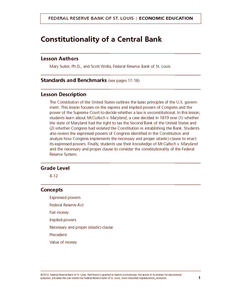Museum of Tolerance
The Role of Citizens in a Participatory Democracy
Groups research participatory democracies and compare the role and rights of citizens in ancient history with those in recent U.S. history. Guided by a series of questions, individuals compose a persuasive essay in which they discuss the...
Center for Civic Education
Citizenship Schools and Civic Education During the Civil Rights Movement and in the Present
Your young historians will discover the importance that citizenship education has played in the social progress of the United States as they learn about early efforts to discourage African Americans from voting in the 1960s.
National Endowment for the Humanities
Lesson 4 James Madison: Internal Improvements Balancing Act—Federal/State and Executive/Legislative
Who has the power? The founding fathers asked the same question when the United States was formed. Learners explore issues that arose during Madison’s presidency that raised constitutional questions. Through discovery, discussion, and...
National Endowment for the Humanities
Lesson 2: The United States, France, and the Problem of Neutrality, 1796–1801
While the French Revolution could be considered inspired by the American Revolution, it created thorny problems for the new United States. Should the United States get involved and be drawn into a European drama? Was the US strong...
Federal Reserve Bank
Constitutionality of a Central Bank
Considering the expressed and implied powers of Congress, was it constitutional for the United States to establish the Second National Bank in the early nineteenth century? What is the constitutionality of the Federal Reserve System?
Alabama Department of Archives and History
Alabama's 1901 Constitution: What Was at Stake?
Who should be able to vote? As part of a study of the 1901 Alabama Constitution, class members examine primary source document that reveal the reasons the authors gave to support their positions on this question and their assumptions in...
Judicial Learning Center
Civil Rights and Equal Protection
Almost every American is familiar with the Supreme Court case of Brown vs. Board of Education. Far fewer understand the constitutional reasoning or the wide-ranging consequences of the ruling in the field of criminology. The interesting...
National Endowment for the Humanities
Lesson 1: The United States Confronts Great Britain, 1793–1796
After the Revolutionary War, the success of the United States was far from guaranteed. Foreign powers coveted the new land, and Great Britain challenged American sovereignty. Learners consider the challenges facing the new nation using...
NPR
Same-Sex Marriage
The battle over same-sex marriage is a prevalent issue in the United States, and a valuable topic to be discussed in your social studies classroom. Here is a basic outline of introductory questions, focus questions, vocabulary, and media...
National Endowment for the Humanities
The House Un-American Activities Committee
Was the House Un-American Activities Committee justified in investigating subversive influences in the entertainment industry? Part two of the three-part series of lessons that examine the anti-communism movement after World War II,...
National Endowment for the Humanities
Soviet Espionage in America
The war against Communism and Joseph McCarthy’s place in it are the focus of a series of three lessons examining postwar America from 1945-1950. This first lesson asks groups to read an introduction that describes the Verona Project and...
Tennessee State Museum
An Emancipation Proclamation Map Lesson
Did the Emancipation Proclamation free all slaves during the Civil War? Why was it written, and what were its immediate and long-term effects? After reading primary source materials, constructing political maps representing information...
Constitutional Rights Foundation
The Cold War: How Did It Start? How Did It End?
What is the difference between a Cold War and a Hot War? Scholars research the beginning of the Cold War. They analyze diary entries as well as excerpts from various events during the 45-year standoff. To finish, they prepare final...
K12 Reader
The Attack on Pearl Harbor
After reading a short passage about Japan's involvement in World War II and why the Japanese attacked Pearl Harbor, readers are asked to analyze how the attack effected the attitudes of Americans who previously had not wanted to go to war.
USA.gov
How The Supreme Court Works
Just how does a case come before the highest court in the land? A graphic flow chart unpacks how plaintiffs come before the Supreme Court. Graphics include background on the nine justices and just how many cases they actually hear each...
Curated OER
Woodrow The White House Mouse
Inauguration Day is January 20. Implement an entire week's worth of mini activities to help young historians become knowledgeable of the President's job, the executive branch, and the White House. The worksheets focus on research skills,...
Constitutional Rights Foundation
Conservation, Preservation, and the National Parks
Going green? Scholars investigate the creation of the US National Park program. Through diary entries as well as expert testimony, they synthesize information and analyze the need for conservation and preservation. Finally, they display...
Constitutional Rights Foundation
Women in the Military
Scholars analyze the role of women in the military in United States history. Using group research, debate, and diary entries, they explore various military activity in America. To complete the lesson, young historians write an essay...
American Institute of Physics
African American Inventors in History
A two-part lesson plan introduces young historians to the work of famous African American inventors. Groups first research and develop a presentation of an inventor that includes biographical information and information about one of...
NYC Department of Records
Citizenship and Elections: The Importance of a Ballot
Approximately 58 prcent of those eligible voted in the 2016 US Presidential election. In an attempt to impress upon learners the importance of voting and voting rights, class members examine primary source documents related to the...
K12 Reader
Biography of Abraham Lincoln
One skill essential to reading comprehension, is learning how to summarize a text. After reading a biography of Abraham Lincoln, readers demonstrate this ability by crafting a brief summary of Lincoln's life.






















